Is your cat peeing on your bed? Don’t worry, you’re not alone. Many cat owners face this frustrating issue. (FACT: One of the most common reasons why cats pee on the bed is due to medical issues or stress.) In this article, we’ll explore the top 9 reasons behind this behavior and provide practical solutions to help you and your feline friend find peace again. Let’s dive in!
Key Takeaways
- Cats may pee on the bed due to medical issues like urinary tract infections, bladder stones, diabetes, or kidney disease.
- Stress and anxiety can also cause cats to urinate on the bed, especially when there are changes in routine or conflicts within the household.
- Litter box issues such as having too few litter boxes or using a location or litter type that the cat dislikes can contribute to this behavior.
- Factors like age, mobility issues, and cognitive decline can also play a role in cats peeing on the bed.
Contents
- Cats peeing on the bed
- 4 Medical Reasons for Cats Peeing on the Bed
- Stress and Anxiety as a Cause for Cats Peeing on the Bed
- Litter Box Issues
- Your Cat’s Health
- Jealousy and Attention-Seeking Behavior
- How to Clean Up Cat Urine from Your Bedding
- Tips to Prevent Cats from Peeing on the Bed
- Recommended Litter Options for a Happier Cat
- Conclusion
- FAQs
Cats peeing on the bed
Cats peeing on the bed is a common issue faced by many cat owners
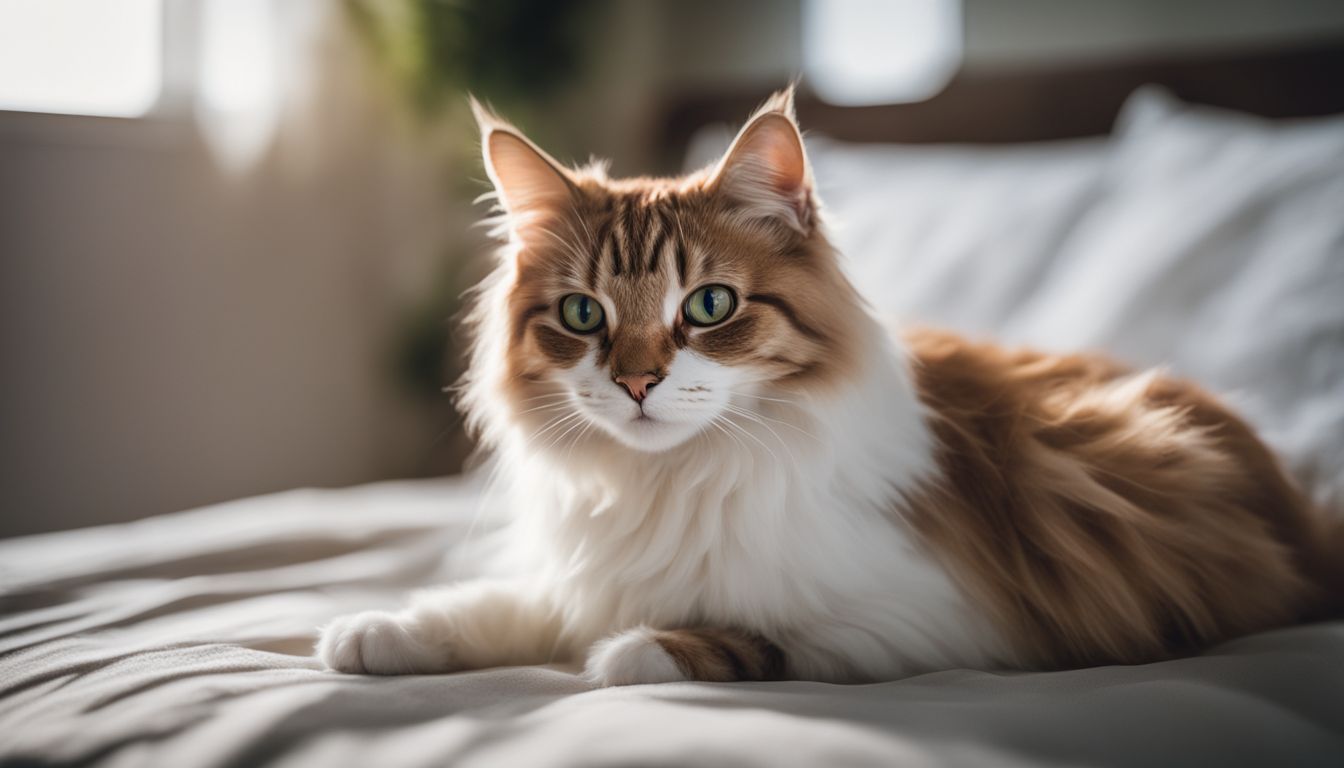
Cats sometimes pee on the bed. This is a common issue facing many cat owners. There can be various reasons for this behavior. Medical conditions like bladder infections or urinary tract issues may cause it.
Stress or changes in routine can also lead to cats peeing on the bed. Other times, problems with their litter box might be at fault. It could also signal health changes, especially in older cats who have mobility trouble or cognitive decline.
Cats may do this too if they seek attention or feel jealous of other pets in the house. Remember, always clean up cat urine from your bedding right away and consult a vet if the problem persists.
This behavior can be caused by a variety of reasons
Cats pee on the bed for many reasons. They might feel sick. Urinary tract infections or bladder stones can cause this problem. Even diabetes and kidney disease are possible causes.
Stress can also make cats act out in this way. A change in routine, a new pet, or fights at home can upset them greatly. Then there’s the matter of litter boxes. Not having enough of them around, placing them in spots they don’t like, or using a type of litter they hate could lead to an issue! Aging is another factor that contributes to this behavior as old age may bring mobility issues and affect their thinking ability too! Sometimes jealousy plays a part if your cat feels left out because you’re paying attention to others more often than him/her!
4 Medical Reasons for Cats Peeing on the Bed

Medical reasons for cats peeing on the bed can include urinary tract infections, bladder stones, diabetes, and kidney disease. If your cat is exhibiting this behavior, it’s important to rule out any potential medical issues.
Click here to learn more about these conditions and how they may be affecting your cat’s bathroom habits.
Urinary tract infections
Cats can get urinary tract infections, like humans. They feel pain when they pee. The cat may associate this pain with the litter box and start to avoid it. Then, your cat might try to find a soft spot for peeing – like your bed! It’s not nice for you or your little friend! If you see blood in its pee or if the cat cries when it goes to the bathroom, take them to a vet right away.
Bladder stones
Bladder stones can make a cat pee on the bed. These are small rocks in their bladder. They hurt and make it hard for your cat to pee right. If you see blood in your cat’s pee, take them to the vet right away.
This is a sign of bladder stones. The vet may need to do surgery to get rid of the stones.
Diabetes
Diabetes is one of the medical conditions that can cause cats to pee on the bed. Just like in humans, diabetes affects how the body processes sugar. When a cat has diabetes, their blood sugar levels can become too high, leading to increased thirst and urination.
If your cat starts peeing on the bed more frequently and also seems excessively thirsty, it’s important to take them to the vet for a check-up. The vet will be able to determine if diabetes is causing this behavior and provide appropriate treatment options.
Managing your cat’s diet and giving them medication as prescribed by the vet can help control their diabetes and reduce inappropriate urination.
Kidney disease
Kidney disease is a possible medical reason why your cat may be peeing on the bed. Cats with kidney disease have trouble filtering waste from their bodies, which can lead to increased urine production.
This makes it harder for them to hold their urine and they may end up urinating in inappropriate places like the bed. If you notice your cat peeing on the bed regularly and suspect kidney disease, it’s important to take them to the vet for proper diagnosis and treatment.
Your veterinarian will be able to recommend specific steps you can take to manage this condition and help prevent accidents on your bedding.
Stress and Anxiety as a Cause for Cats Peeing on the Bed
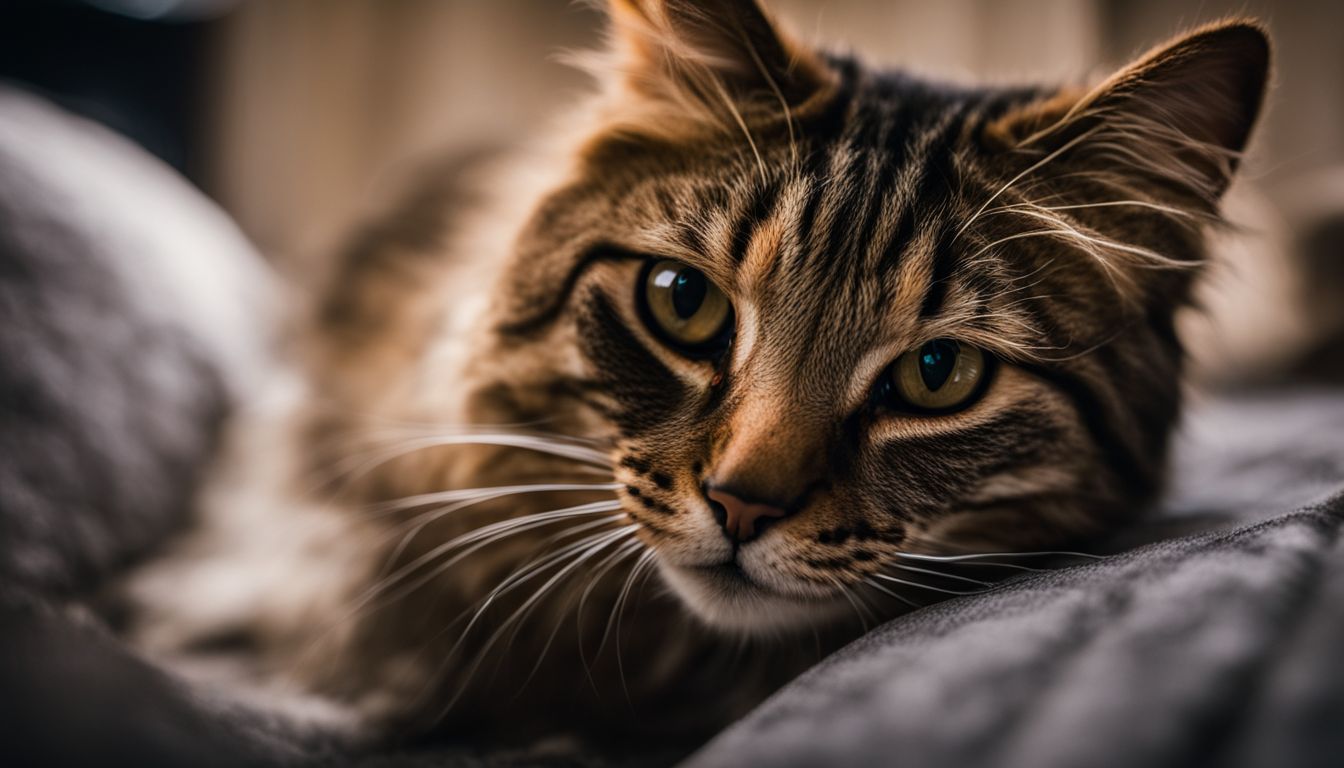
Stress and anxiety can lead to cats peeing on the bed, especially when there are changes in their routine, conflicts within the household, or the introduction of a new pet.
Changes in routine
Changes in routine can be a major cause of stress and anxiety for cats, which can then lead to inappropriate urination. Cats are creatures of habit and thrive on consistency, so any sudden changes in their daily routine can disrupt their sense of security.
This includes changes such as moving to a new house, having visitors over, or even just changes in feeding times. It’s important to try and maintain a stable and predictable routine for your cat to help them feel more secure and reduce the chances of them peeing on the bed.
Introducing a new pet
Introducing a new pet can be a stressful experience for your cat, and it may lead to inappropriate urination on the bed. Cats are territorial creatures, and they may feel threatened or anxious when another animal enters their space.
This change in the household dynamic can disrupt their routine and trigger stress-related behaviors like peeing on the bed. To help your cat adjust to a new pet, make sure to provide separate spaces for each animal and gradually introduce them under supervision.
Giving your cat plenty of attention and reassurance during this transition period can also help reduce their anxiety. By taking these steps, you can minimize the chances of your cat peeing on the bed due to introducing a new pet into the home.
Household conflicts
Sometimes, cats pee on the bed because of conflicts in the household. This could be caused by fights between family members or other pets in the house. Cats are sensitive creatures and they can become stressed or anxious when there is tension around them.
They might use peeing as a way to mark their territory or show that they are unhappy. If you notice this behavior in your cat, it’s important to address any conflicts in your home and create a peaceful environment for your furry friend.
Litter Box Issues
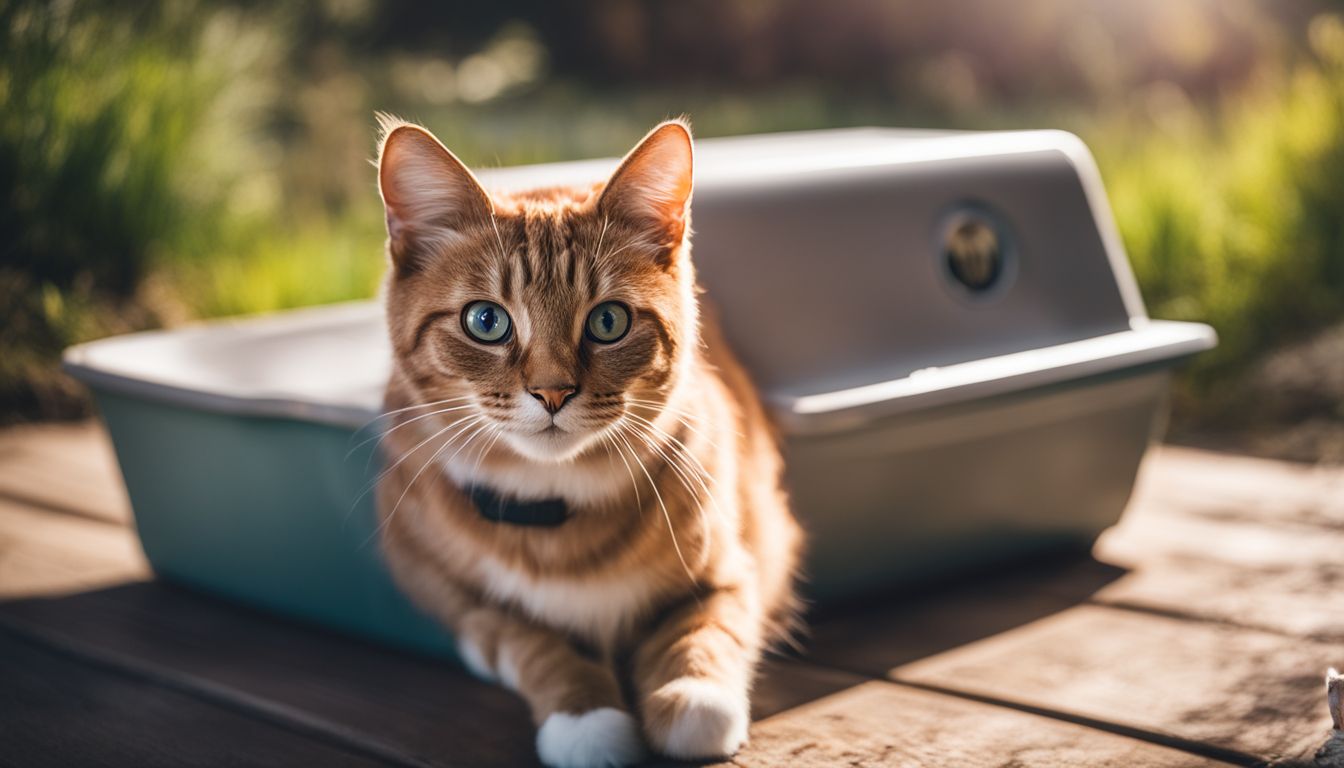
Litter box issues can contribute to cats peeing on the bed. Factors such as not enough litter boxes, dislike of location or litter type can cause your cat to seek alternative places to relieve themselves.
Find out more about how you can address these issues and prevent bed peeing in our blog post!
Not enough litter boxes
If your cat is peeing on the bed, it could be because there aren’t enough litter boxes in your home. Cats need multiple litter boxes to feel comfortable and have options when they need to go.
Having too few litter boxes can cause stress and anxiety for your cat, leading them to pee on the bed instead. Make sure you have one more litter box than the number of cats you have, and place them in different areas of your home for easy access.
This will help prevent accidents and keep your cat happy.
Dislike of location
Sometimes, cats pee on the bed because they don’t like the location of their litter box. Maybe it’s in a noisy area or near something that scares them. Cats prefer quiet and safe spaces to do their business.
If your cat is peeing on the bed, try moving the litter box to a more peaceful spot where they feel comfortable. This might help prevent accidents and keep your kitty happy.
Dislike of litter type
Some cats may pee on the bed because they don’t like the litter type in their litter box. Cats can be picky about certain textures or smells, so it’s important to find a litter that your cat is comfortable with.
If you notice that your cat is avoiding the litter box and urinating on the bed instead, try experimenting with different types of litter. You may need to test out clumping versus non-clumping, scented versus unscented, or even switch from clay to corn-based options.
By finding a litter that your cat likes, you can help prevent them from peeing on your bed and encourage proper bathroom behavior.
Your Cat’s Health
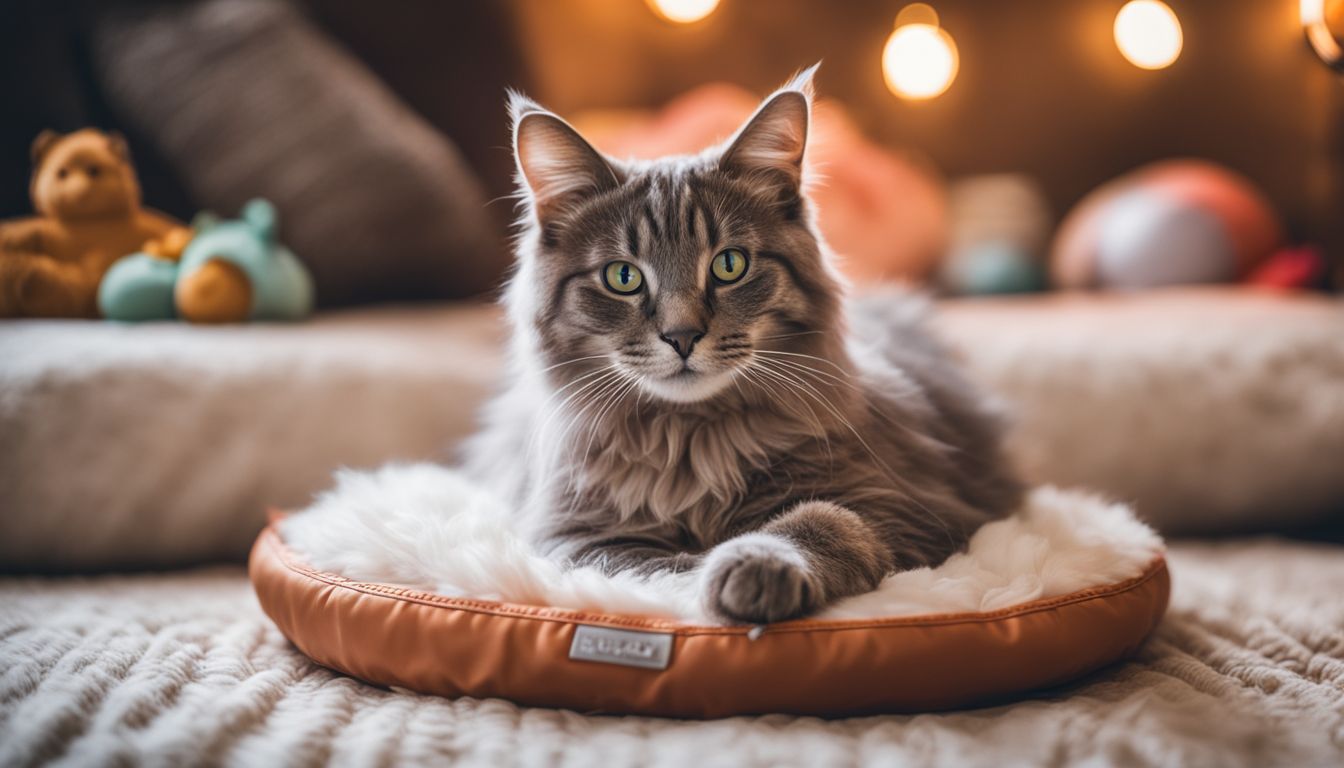
Your cat’s health, including their age and any mobility or cognitive issues they may be experiencing, can contribute to them peeing on the bed.
Age
As cats age, they may experience changes in their urinary system that can contribute to peeing on the bed. Older cats are more prone to medical conditions like bladder infections and urinary tract infections, which can cause them to urinate outside of the litter box.
Additionally, as they get older, cats may develop mobility issues or a decline in cognitive function, making it harder for them to reach the litter box or remember where it is. It’s important to keep an eye on your cat’s health as they age and consult with your veterinarian if you notice any changes in their behavior.
Mobility issues
Mobility issues can also contribute to a cat peeing on the bed. As cats get older, they may experience joint pain or arthritis, making it difficult for them to climb in and out of the litter box.
This can lead them to find alternative places, like your bed, to relieve themselves. It’s important to provide easy access to the litter box for your cat by placing it in an easily reachable location and considering a low-entry litter box if needed.
Regular vet check-ups can help identify any mobility issues and address them appropriately.
Decline in cognitive function
Cats, like humans, can experience a decline in cognitive function as they age. This can contribute to inappropriate urination behavior, such as peeing on the bed. As cats get older, their cognitive abilities and memory may not be as sharp, leading to confusion and disorientation.
They might forget where the litter box is or have difficulty finding it due to their declining mental faculties. It’s important to be patient with your cat during this time and provide them with easy access to a clean litter box in a familiar location.
Jealousy and Attention-Seeking Behavior
Cats may pee on your bed because they feel jealous or want attention. Sometimes, when you pay more attention to another pet or person, your cat might get upset and act out by peeing on the bed.
They want you to notice them and give them more love and attention. It’s important to understand their feelings and try to give them equal attention so they don’t feel left out.
How to Clean Up Cat Urine from Your Bedding

- Remove any solid waste from the bedding using disposable gloves.
- Blot the urine stain with paper towels or absorbent cloths to soak up as much liquid as possible.
- Mix a solution of white vinegar and water (1 part vinegar to 2 parts water) in a spray bottle.
- Spray the urine stain with the vinegar solution and let it sit for a few minutes.
- Blot the area again with paper towels or absorbent cloths to remove more moisture.
- Sprinkle baking soda over the stain and let it sit for a few hours to absorb any remaining odors.
- Vacuum or brush off the baking soda from the bedding.
- Launder your bedding according to the care instructions, adding an enzyme – based pet urine cleaner to help eliminate any lingering smells.
That’s it! Now your bedding should be clean and fresh again. Remember, if your cat continues to pee on the bed, it’s important to address the underlying reasons causing this behavior.
Tips to Prevent Cats from Peeing on the Bed
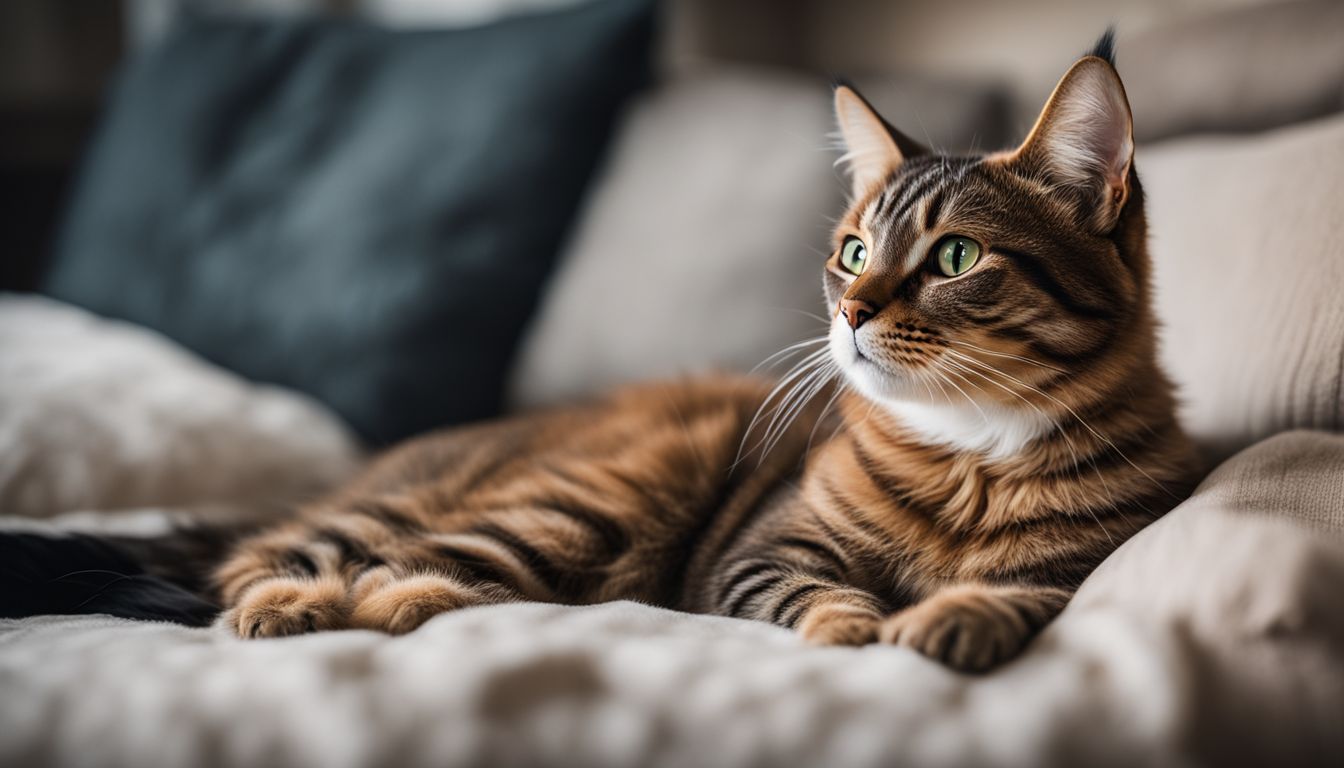
Take your cat for regular vet check-ups, address any potential stress and anxiety triggers, make necessary changes to the litter box setup, ensure it is clean and comfortable, and consider jealousy or competition with other cats in the household.
Regular vet check-ups
Regular vet check-ups are crucial for maintaining the overall health and well-being of your cat. These check-ups allow the veterinarian to monitor your cat’s health, catch any potential issues early on, and provide necessary vaccinations and preventative treatments.
During these visits, the vet can also address any concerns you may have about your cat’s urination behavior and provide guidance on how to manage it effectively. By scheduling regular veterinary check-ups, you can ensure that your cat receives the proper care they need to stay healthy and minimize the chances of them peeing on your bed.
Addressing stress and anxiety
Cats can sometimes pee on the bed because they feel stressed or anxious. Changes in routine, introducing a new pet, or conflicts at home can all contribute to these feelings. To address stress and anxiety, try to keep your cat’s environment calm and consistent.
Provide plenty of hiding spots and vertical spaces for them to feel safe. Spend quality time playing with your cat and give them attention. Create a routine that includes feeding, playtime, and rest.
If needed, consult with a veterinarian about possible medication or behavioral techniques.to help reduce your cat’s stress and anxiety levels.
Making litter box changes
To address litter box issues and prevent your cat from peeing on the bed, there are a few changes you can make. First, make sure you have enough litter boxes in your home – at least one per cat plus an extra one.
Next, consider the location of the litter box. It should be in a quiet and accessible area that is easy for your cat to reach. Additionally, try different types of litter to see what your cat prefers.
Some cats may not like scented or clumping litters, so opt for unscented options or non-clumping alternatives like wood pellets. By making these changes, you can help create a clean and comfortable environment for your cat to use the litter box properly.
Ensuring a clean and comfortable litter box
Keeping your cat’s litter box clean and comfortable is crucial in preventing them from peeing on your bed. Make sure to scoop the litter box at least once a day to remove any waste.
Replace the litter regularly, as cats prefer a clean surface to do their business. Additionally, provide enough litter boxes for your cat, especially if you have multiple cats. Some cats may also have preferences regarding the type of litter or location of the box, so experiment with different options to find what works best for your furry friend.
By maintaining a clean and inviting litter box, you can help discourage your cat from using your bed as their personal bathroom.
Check for medical issues first
To figure out why your cat is peeing on the bed, it’s important to check for any medical issues first. Sometimes, urinary tract infections, bladder stones, diabetes, or kidney disease can cause cats to urinate outside the litter box.
If your cat is experiencing any discomfort while urinating or if you notice changes in their behavior or appetite, it’s best to take them to a vet for a check-up. The vet will be able to determine if there are any underlying medical issues that need to be addressed.
Remember, addressing these medical conditions can help resolve the problem of your cat peeing on the bed.
Reduce stress and anxiety
Cats can sometimes pee on the bed due to stress and anxiety. Changes in routine, introducing a new pet, or household conflicts can all contribute to their nervousness. To reduce their stress, it’s important to create a calm and stable environment for your cat.
You can do this by providing them with plenty of hiding spots, offering interactive toys for mental stimulation, and establishing a consistent daily routine. Additionally, giving your cat regular playtime and attention can help alleviate their anxiety.
Address potential litter box issues
To prevent your cat from peeing on the bed, it’s important to address any potential litter box issues. One common issue is not having enough litter boxes. Make sure you have one more litter box than the number of cats you have in your home.
Cats also have preferences when it comes to the location and type of litter they use. Experiment with different locations and types of litter until you find what works best for your cat.
Keeping the litter box clean and comfortable is another key factor. Scoop it daily and completely change the litter at least once a week. By addressing these potential issues, you can help discourage your cat from using the bed as a bathroom.
Consider jealousy and competition with other cats
If your cat is peeing on the bed, jealousy and competition with other cats could be a possible reason. Cats can feel threatened or insecure when there are other cats in the house. This can lead to marking their territory by urinating on your bed.
It’s important to create a harmonious environment for all your cats and provide separate spaces and resources for each cat to reduce any feelings of rivalry or jealousy.
Recommended Litter Options for a Happier Cat
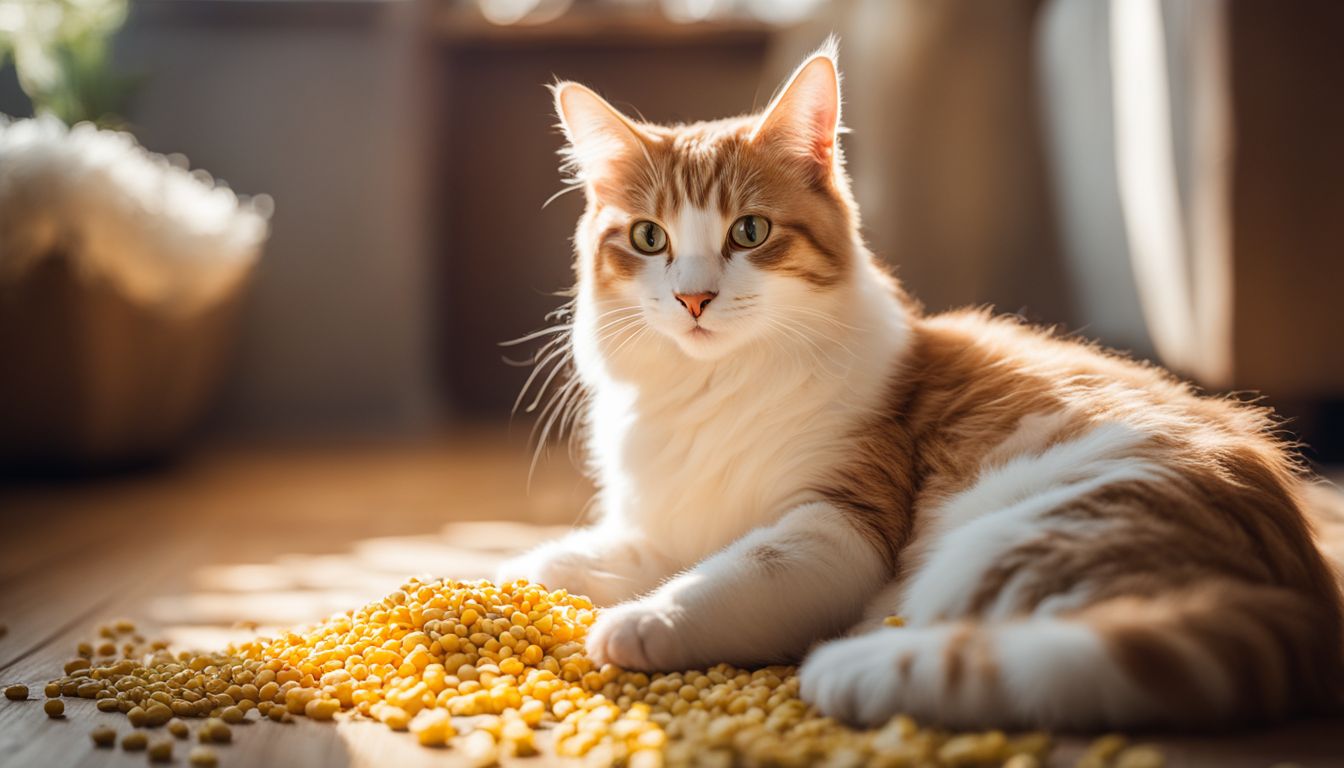
To keep your cat happy and reduce the likelihood of them peeing on the bed, consider using litter options such as corn-based clumping litter, unscented clay litter, scented multi-cat litter, non-clumping wood litter, and high-performance clumping litter.
Corn-based clumping litter
Corn-based clumping litter is a great option for cat breeders because it offers several benefits. First, it forms tight clumps that are easy to scoop, making clean-up a breeze. This can help maintain a fresh and odor-free environment for your cats.
Second, corn-based litter is biodegradable and more environmentally friendly compared to traditional clay litters. Third, it is often hypoallergenic and gentle on sensitive paws. Lastly, some corn-based litters have natural additives like baking soda or plant extracts to further control odors.
Overall, corn-based clumping litter provides convenience, sustainability, and comfort for both you as a breeder and your cats.
Unscented clay litter
Unscented clay litter is a good option for cats who are sensitive to strong smells. Some cats can be bothered by scented litters, so using an unscented one can help prevent them from avoiding the litter box.
Clay litter is also known for its ability to clump, which makes it easier to clean and maintain the litter box. Just make sure to regularly scoop out the clumps and replace with fresh litter as needed.
Scented multi-cat litter
Scented multi-cat litter may seem like a good choice for controlling odor, but it might not be the best option for your cat. Cats have sensitive noses, and strong scents from the litter can actually deter them from using the litter box.
The artificial fragrance may also irritate their respiratory system. It’s better to opt for unscented litter that is specifically designed for multiple cats, as it will still control odor effectively without overwhelming your feline friends.
Non-clumping wood litter
Non-clumping wood litter is a popular option for cat owners looking for an environmentally friendly and natural alternative. This type of litter is made from recycled wood fibers, such as pine or cedar.
It has a pleasant scent that helps to control odors, making it ideal for indoor use. Non-clumping wood litter is also known for its high absorbency, which means it can hold a lot of liquid without becoming soggy.
This not only keeps your cat’s paws clean but also helps to prevent tracking throughout your home. Another benefit of non-clumping wood litter is that it is biodegradable and can be safely flushed down the toilet or composted.
Overall, this type of litter provides a natural and eco-friendly solution for cat owners who want to keep their cats comfortable while minimizing their impact on the environment.
High-performance clumping litter
High-performance clumping litter is a great option for cat owners who are dealing with their cats peeing on the bed. This type of litter forms strong and tight clumps when your cat urinates, making it easier to clean up and preventing urine from soaking into the bedding.
It also controls odors effectively, keeping your home smelling fresh. High-performance clumping litter is typically made from natural materials like clay or corn, and it comes in unscented and multi-cat options.
Using this type of litter can help create a more comfortable environment for your cat and discourage them from urinating on the bed.
Unscented and multi-cat options
For cat breeders dealing with cats peeing on the bed, using unscented litter and multi-cat litter options can be helpful. Unscented litters are a good choice because some cats may be sensitive to strong odors.
Multi-cat litters are designed to control odor more effectively, which can discourage cats from seeking out other places to urinate. By providing these litter options, you give your cats a comfortable and suitable place to do their business, reducing the likelihood of them choosing your bed instead.
Conclusion

If your cat is peeing on the bed, it’s important to understand the reasons behind this behavior. It could be due to medical issues like urinary tract infections or stress and anxiety.
Litter box problems, jealousy, and attention-seeking behavior can also contribute to this problem. By addressing these issues and providing a clean and comfortable litter box, you can help prevent your cat from peeing on the bed.
Remember to consult with your vet for any underlying health concerns as well.
FAQs
1. Why is my cat peeing on the bed?
There are several possible reasons why your cat may be peeing on the bed, including medical issues, stress or anxiety, territorial marking, or a dirty litter box.
2. How can I stop my cat from peeing on the bed?
To stop your cat from peeing on the bed, make sure to address any underlying medical conditions and keep the litter box clean. Provide multiple litter boxes in different areas of the house and try using pheromone sprays or diffusers to reduce stress.
3. Should I punish my cat for peeing on the bed?
No, it’s not recommended to punish your cat for peeing on the bed as it can create additional stress and worsen their behavior. Instead, focus on understanding and addressing the underlying cause.
4. When should I take my cat to see a veterinarian about this issue?
If you have tried addressing environmental factors and your cat continues to pee on the bed, it’s best to consult with a veterinarian. They can rule out any medical issues that may be causing this behavior.
5. Can neutering/spaying my cat help prevent them from peeing on the bed?
Neutering or spaying your cat can help reduce certain territorial behaviors like marking with urine, but it may not completely eliminate this behavior in all cases. It is still important to address other potential causes and provide appropriate resources for your cat’s needs.

